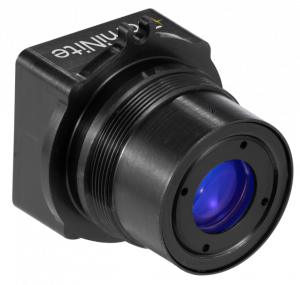SRI’s new DomiNite® digital camera stands to disrupt analog low-light imaging technology
SRI's digital low-light camera, DomiNite, is available for commercial use, set to replace analog technology.
The result is DomiNite, an extremely light and small camera compared to analog night vision devices that rely on intensifier tubes. The core DomiNite product easily integrates into existing platforms, weighs less than half an ounce, and comes with an integrated lens consuming a volume of a little more than one cubic inch. Ideal for head-worn applications, DomiNite provides high dynamic range — crucial for diverse nighttime conditions. Unlike image intensifiers, it can simultaneously provide a clear image of bright and low-light areas and is not overwhelmed or damaged by sudden light bursts.
Digital low-light camera sensors have larger pixels and lower noise than typical daytime cameras. When light is sparse, every photon matters. SRI’s approach to capturing those photons is rooted in a patented “Quad Pixel” design. “This is the heart of the DomiNite system,” says Colin Earle, director at SRI’s Center for Advanced Imaging. “Thanks to our Quad Pixel technology, we believe that DomiNite is the most sensitive digital low-light imager that has been deployed in the field.”
The Quad Pixel design allows for two different modes. High-resolution mode operates well down to about “quarter-moon” conditions. When it gets even darker, for example, in moonless or cloudy conditions, the high-sensitivity mode automatically kicks in, providing the signal boost necessary for effective vision.
DomiNite aims to improve situational awareness for dismounted soldiers, enhance driver vision in ground vehicles, and provide superior intelligence, surveillance, and reconnaissance (ISR) capabilities for UAVs. In a commercial context, DomiNite is designed to bring new capabilities in areas like law enforcement, security, autonomous navigation, and outdoor recreation.
Invented in the late 1940s, analog image intensifier tubes have remained the gold standard for night vision. Today, thanks to image intensifier tubes, American soldiers have been operating safely and effectively in the darkest night-time conditions. Its challenges, however, have been that these cameras are based on inherently analog technology and can’t readily plug into emerging AI and object recognition technologies or sync with digital thermal imagers. Today’s best image intensifiers are also hard to make, fragile, and expensive. Additionally, analog imagers perform exceptionally well in low-light conditions but not in brighter conditions. If exposed to a sudden burst of light, they are easily blinded and can be damaged.
“Lots of people claim to have digital night vision cameras, and some of them do a pretty good job,” says Colin Earle, director at SRI’s Center for Advanced Imaging. “But they just don’t have the low-light sensitivity that we have.”
The SRI team will continue to decrease DomiNite’s size, weight, and power (SWaP), while also providing different configurations with a range of opto-mechanical and digital interfaces (USB, PoE, Camera Link). They have built reference designs demonstrating integration into binoculars and scopes, which will enable defense contractors and commercial customers to quickly embed the camera into larger platforms.
Continuing the innovation, the team is working with a startup called Deepnight to process video through an AI signal-processing algorithm. With the algorithm, an image taken in dark “starlight” conditions becomes as clear as a non-processed image taken in ten-times-brighter “quarter-moon” conditions. To extend the potential applications of digital low-light imaging, SRI is pursuing multiple paths that will enhance DomiNite. To learn more, visit DomiNite.sri.com.
About SRI
SRI is an independent nonprofit research institute headquartered in Menlo Park, Calif., with a rich history of supporting government and industry. We create and deliver world-changing solutions for a safer, healthier, and more sustainable future. For almost 80 years, we have collaborated across technical and scientific disciplines to discover and develop groundbreaking products and technologies and bring innovations and ideas to the marketplace. Learn more at www.sri.com.
Kelly Brieger
SRI
+1 650-704-1748
email us here
Visit us on social media:
Facebook
LinkedIn
Instagram
YouTube
Legal Disclaimer:
EIN Presswire provides this news content "as is" without warranty of any kind. We do not accept any responsibility or liability for the accuracy, content, images, videos, licenses, completeness, legality, or reliability of the information contained in this article. If you have any complaints or copyright issues related to this article, kindly contact the author above.
Length of Hospitalization for Stage III and IV Decubitus Ulcers Before and After 2015
The Blair Memory Care Opens in Cary, NC to Strong Community Support
Premier Auto Protect Earns 2025 Buyer’s Choice Award from ConsumerAffairs, Based on Verified Customer Reviews
Kalendarium
Więcej ważnych informacji
 Jedynka Newserii
Jedynka Newserii

 Jedynka Newserii
Jedynka Newserii

Transport

Import materiałów budowlanych z Rosji zagrożeniem dla konkurencyjności europejskiego rynku. Konieczne są zmiany i egzekwowanie sankcji
Unia Europejska powinna zrewidować politykę celną na import materiałów budowlanych spoza państw członkowskich, w tym państw wschodnich – twierdzą uczestnicy konferencji „Bezpieczeństwo gospodarcze UE”. Obecnie Wspólnota nakłada na europejskich producentów coraz więcej ograniczeń, nie rewidując polityki celnej, co przekłada się na systematyczne osłabienie konkurencyjności przedsiębiorstw, spadek produkcji i zagrożenie dla miejsc pracy.
Konsument
Polacy odczuwają brak wiedzy na temat inwestowania. Może to sprzyjać podejmowaniu nieracjonalnych decyzji finansowych

Co trzeci Polak odczuwa brak wiedzy w obszarze inwestowania, a tylko co piąty chciałby pogłębić swoją wiedzę na ten temat – wynika z badania „Poziom wiedzy finansowej Polaków 2025”. Ci, którzy na własną rękę szukają informacji i porad, coraz częściej sięgają do blogów, portali, podcastów i wideo w internecie. Eksperci przestrzegają, że finansowych i inwestycyjnych porad udzielają nie tylko specjaliści w danej dziedzinie, więc potrzebna jest zasada ograniczonego zaufania.
Handel
Do 2030 roku liczba plastikowych opakowań w e-handlu modowym może się podwoić. Ich udział najszybciej rośnie w Polsce

Wraz ze wzrostem kanału e-commerce w branży modowej rośnie liczba wykorzystywanych opakowań, z których znaczną część wciąż stanowią te z plastiku. Do 2030 roku w Polsce e-sprzedawcy zużyją 147 mln plastikowych opakowań – wynika z badania przeprowadzonego na zlecenie DS Smith. Można zauważyć rosnący trend wśród marek modowych, które coraz częściej wybierają opakowania wykonane z papieru lub materiałów z recyklingu. To o tyle istotne, że polscy konsumenci odczuwają wyrzuty sumienia z powodu ilości plastiku, w którym dostarczane są ich zamówienia.
Partner serwisu
Szkolenia

Akademia Newserii
Akademia Newserii to projekt, w ramach którego najlepsi polscy dziennikarze biznesowi, giełdowi oraz lifestylowi, a także szkoleniowcy z wieloletnim doświadczeniem dzielą się swoją wiedzą nt. pracy z mediami.









.gif)

 |
| |
| |
|